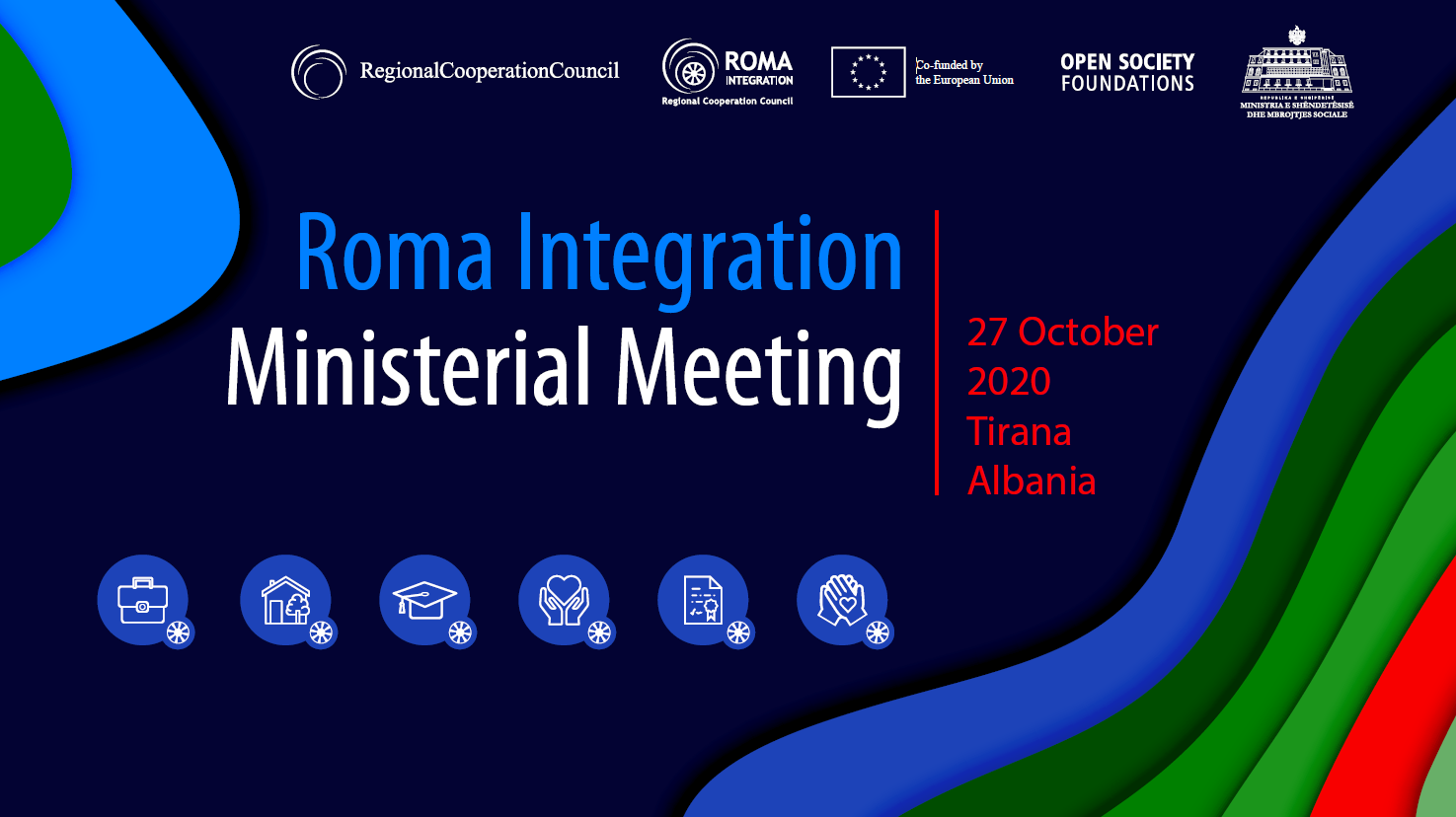Conclusions of the Ministerial Meeting on Roma Integration
- 27 Oct 2020
- News

Ministerial meeting
Following the endorsement of the Declaration of Western Balkans Partners on Roma Integration within the EU Enlargement Process1 (Poznan Declaration) at the Western Balkans Leaders’ Summit in Poznan, Poland on 05 July 2019, the Ministry of Health and Social Protection of Albania and the Regional Cooperation Council co-organized a Ministerial meeting on 27 October 2020 to assess the progress made so-far in achieving the Poznan Declaration objectives and discuss the further steps necessary to progress with the Declaration targets and commitments.
The Ministers of the Western Balkans responsible for Roma Integration/Heads of Delegations:
RECALLING the commitments made with the Declaration of Western Balkans Partners on Roma Integration within the EU Enlargement Process,
RECOGNIZING the importance of having a coherent approach towards economic development of the region while taking into consideration the needs of the most vulnerable and deprived,
ACKNOWLEDGING the COVID-19 pandemic crisis has significantly deteriorated the economic situation of many vulnerable communities, including Roma,
WELCOMING the Economic and Investment Plan for the Western Balkans, that highlights the importance of Roma integration in human capital investments, including in access to education and labour market participation,
UNDERLINING the significance and reference of the EU Roma Strategic Framework for equality, inclusion and participation 2020-2030 for the Western Balkans region,
ACTING upon the commitment made in Poznan on 05 July 2019 to meet at a ministerial meeting in order to report on achievements and shortcomings within the first year of implementation of the Poznan Declaration,
AGREE to strengthen the ongoing work on Roma integration in general, and more specifically:
1. On housing (point 1.b) of the Poznan Declaration), the Ministers responsible for Roma Integration/Heads of Delegations welcomed the Methodology for geographic mapping of the situation of Roma in the area of housing and recognized the positive outcomes of the pilot initiative to collect data in housing in two municipalities per economy. The Ministers/Heads of Delegations undertake to complete the geographic mapping exercise of Roma settlements by the end of 2021 and use its findings as a basis for further steps towards legalisation, provision of decent housing for those whose dwellings cannot be legalised, and ensure access to public infrastructure and benefit of public services. The Ministers/Heads of Delegations support the role of the Regional Cooperation Council as a facilitator of this process and encourage them to enhance its activities aimed at fulfilment of this objective.
2. On civil registration (point 1.e) of the Poznan Declaration), the Ministers responsible for Roma Integration/Heads of Delegations welcomed the initiative to develop Roadmaps towards Ending Statelessness of Roma, outlining the specific actions to be undertaken in order to achieve full eradication of statelessness and mechanisms for its prevention. The Ministers/Heads of Delegations confirmed that Roadmaps towards Ending Statelessness of Roma will be adopted in the course of 2021 and recognized the role of the Regional Cooperation Council as a facilitator of this process, including in developing Roadmap proposals.
3. On data collection, (point 2 of the Poznan Declaration) the Ministers responsible for Roma Integration/Heads of Delegations reaffirm the need to establish proper monitoring and reporting mechanism on the progress on Roma integration, including the targets set with the Poznan Declaration. The Ministers/Heads of Delegations welcomed the pilot project led by the Government of North Macedonia, who entrusted the national statistical office with the design and regular implementation of a national Roma Survey. The design of the national survey is consistent with the Roma Survey implemented by the Agency for Fundamental Rights, as entrusted by the European Union. The Ministers/Heads of Delegation recognised the effort and commit to follow similar processes to establish robust monitoring systems, where possible benefitting from the expertise and input of the European Union Agency for Fundamental Rights. The Regional Cooperation supports the pilot project and stands ready to provide similar support to the statistical offices in the region.
4. In line with point 4 of the Poznan Declaration, the Ministers responsible for Roma Integration/Heads of Delegations welcomed the Guidelines for Roma Responsive Budgeting, and take note of the positive outcomes of the initiatives piloted in several budgetary programmes per economy for the benefit of both Roma and the society as a whole. The Ministers/Heads of Delegations commit to further explore approaches in order to systematise the Roma responsive budgeting principles in the legislation and practices at central and local level.
5.The Ministers responsible for Roma Integration/Heads of Delegations welcomed the EU Roma Strategic Framework for equality, inclusion and participation 2020-2030 and they recognized significance of the Western Balkans region within this framework. In line with point 5 and point 9 of the Poznan Declaration, the Ministers/Heads of Delegations commit to develop, update and align their national Roma integration strategies with the EU Roma Strategic Framework.
With regards to the other objectives, pledged in the Poznan Declaration, the Ministers responsible for Roma Integration/Heads of Delegations reported on progress made in each area. The Ministers/Heads of Delegations remain committed to further the process of Roma integration, especially in the context of the COVID-19 pandemic, by enhancing regional cooperation and sharing good practices that will provide for greater protection of Roma and improving their socio-economic status.
The Ministers responsible for Roma Integration/Heads of Delegations also agree to meet at a follow up Ministerial meeting in 2021 in order to discuss the implementation of the above mentioned commitments and the overall progress on implementation of the targets specified in the Poznan Declaration.
The leaders of the Western Balkans Six, Albania, Bosnia and Herzegovina, Kosovo*, Montenegro, Republic of North Macedonia and Serbia, endorsed the Conclusions of the Ministerial Meeting on Roma Integration at the Berlin Process Summit held on 10 November, 2020 in Sofia.






